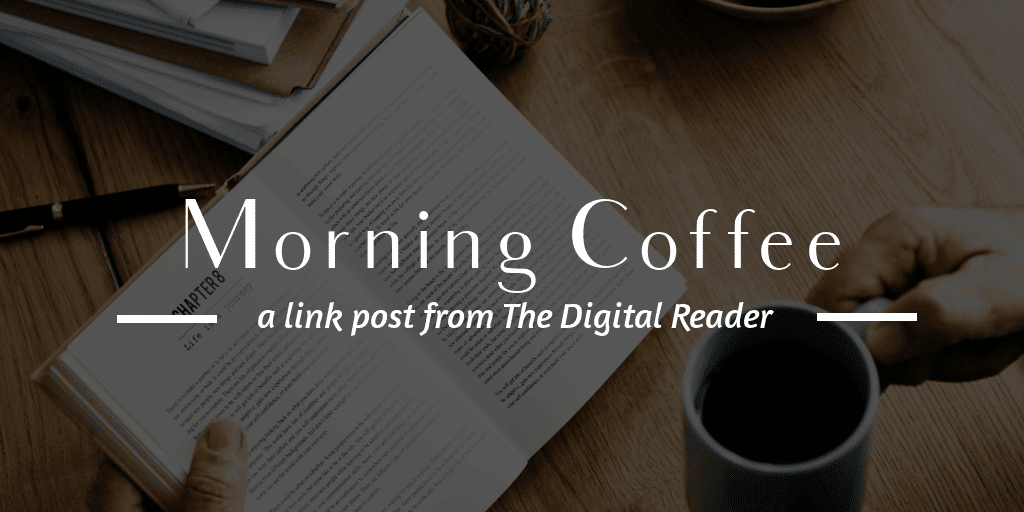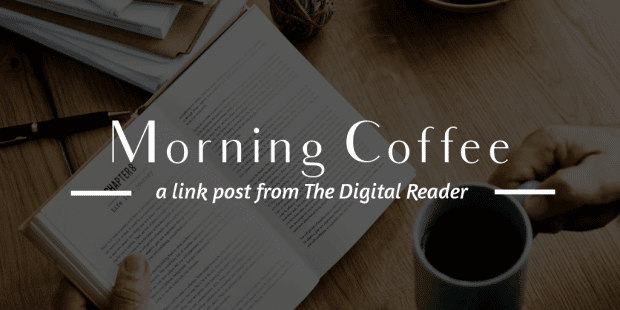Morning Coffee – 27 April 2020

Here are a few stories to read this Monday morning.
- MS Word now flags two spaces after a full stop as an error.
- The Washington Post takes a look at Bookshop, the retail platform for indie bookstores that Amazon will be buying shortly. (It is succeeding where many have failed.)
- Bookbub digs into how the quarantine has changed book-buying behavior (like many, they think buying is the same as reading, which it’s not).
- Kris Rusch explores how trad pub is going wither away during the quarantine.
- Gabino Iglesias has a hate list consisting of ten types of writers.
- Mike Shatzkin notes that POD is suddenly more important given how the print supply chain has been disrupted by the current crisis.
- BookRiot has culled a list of the best parts of Reddit to find book recommendations.
- "And when the librarians returned, they found that the cleaner had put the books back in order of size." (no, that is not a horror story – it actually happened)


Comments
Allen F April 27, 2020 um 9:29 am
I see nothing wrong with sorting books by size. 😉
I got no results at one library, pointing out that for some unknown reason they had split a science fiction series between science fiction and fantasy. (David Weber’s Honor Harrington series.)
As to MS Word, there’s a reason I’m still using the one from Office 2000 (that came free with my Dell system running 98.)
Nate Hoffelder April 27, 2020 um 10:29 am
my local public library split up Eric Flint’s ring of fire series
Disgusting Dude April 27, 2020 um 12:18 pm
It probably couldn’t fit on a single rack.
It’s like the ad bunny…it keeps going and going…
…and they’re readable.
Disgusting Dude April 27, 2020 um 12:22 pm
The Rusch piece is must reading.
It also opens up the question: who among the BPHs (and mid-sizers) will be left standing after the dust setles in 2022.
S&S is looking even more like roadkill. The billion dollar price tag looks more and more like a price gag.
Nate Hoffelder April 27, 2020 um 1:17 pm
S&S’s parent company wants to sell, so if the financial situation turns bad for S&S they might actually be allowed to go bankrupt, with everything to be sold off at auction.
Disgusting Dude April 27, 2020 um 3:22 pm
Wouldn’t they have to spin it off first?
It’s a division, I believe, not a wholly (or partially owned) independent. Their debts are Viacom’s debts.
They might IPO it as an auction of sorts or flip it to some venture capital outfitm All those copyrights have values. Plus, somebody actually spent money to get B&N.
Rusch didn’t sound particularly hopeful for the bigger ones, which suggests the Penguin, but I think MacMillan and Hachete are the other targets to flounder.
MacMillan can’t be too well off, considering their antics of late, before the crisis.
Xavier Basora April 27, 2020 um 6:43 pm
@Disgustingdude
It depends if Viacom can fob off Simon &Shuster’s debts on the spin off. If not Viacom will simply strip mine the imprint selling them off one by one or just writing them off under bankruptcy. Whatever minimizes the losses.
xavier
Disgusting Dude April 27, 2020 um 8:24 pm
Viacom has a third option: fire the staff, close the offices, and keep a handful of personnel to manage retailer relation for POD and digital. Stop doing new books and just count the backlist money as it trickles in. It’s not that their catalog doesn’t sell, just that running their new book operation costs more than it brings in so adding backlist barely breaks even.s
They don’t have to sell everything, justget out of new book publishing.
Peter Winkler April 27, 2020 um 10:49 pm
If I had a dollar for every time some self-appointed publishing expert predicted the imminent demise of the publishing industry, I’d be a millionaire. Since bookstores aren’t necessary to get printed books into readers' hands because they can be mailed and since content can be presented as ebooks and audiobooks, publishers can continue to see a predictable source of income during the Covid lockdown. And agents, editors, and authors can work effectively from home.
Disgusting Dude April 28, 2020 um 6:59 am
Yes, publishing will survive. There’s always the option to stop publishing new books and live off milking copyrights, as I pointed out above.
Individual players have no survival guarantee, though.
And yes, publishers still get (a trickle of) income from digital and previously delivered books.
But digital is (intentionally) a small fraction and new releases are the primary source of revenue and those are stuck in warehouses. It’s not as if traditional publisher can sell them themselves.
On the flip side, warehouse costs continue. Rent continues.
The ratio of revenue to fixed costs is underwater.
And, unlike, tech companies, traditional publishers aren’t sitting on vast cash hoards. They live on sales revenue and lines of credit. The former is drastically reduced and the latter on banks perception on their ability to service. The longer revenue remains depressed, the harder servicing debt becomes and at some point the banks say no more. Liquidity is at risk, for non-chain booksellers, B&N, and a lot of traditional publishers. This is a very real threat.
A long time ago, a young Bill Gates dictated that Microsoft maintain enough cash on hand to fund a full year of operations witbout any revenues. Many found that amusing but at the time MS had but two revenue streams (BASIC, and the Z80 card for Apple II) so his concern of having to pay staff, rent, and other fixed charges was a true concern. MS is now a big company with cash reserves bigger than the GDP of a small country but the current crisis highlights the importance of a company’s cash reserves.
Companies can’t subsist off sales alone.
And publishing isn’t the kind of high margin business that allows for cash hoards: most live of quarterly sales, the equivalent of "paycheck to paycheck". If the line of credit dries up bad things will follow.
The sky isn’t falling but the well is running dry on tbe farm.
The risk is significant; hence the talk of consolidation and closures.
Disgusting Dude April 28, 2020 um 9:46 am
The big takeaway from the Rusch piece isn’t tbe current lack of print sales: it’s tbe books being held back.
Sooner or later bookstores will open and restock. But what will they restock with?
Tradpub works by slots (like theaters) so will they slide everything back six months? Dump the titles whose slots are passed in favor of the originally scheduled? Or ship everything "old" and "new" out at once?
Bookstores have finite shelves so they won’t be able to fit everything so will they stock less of each or will they stick with the big name and return tbe rest for credit? A lot of books already printed will not sell or get remaindered to compete with the full price ones. And if there is a flood of store closures that means even less shelf space.
That means more power to Amazon and B&N and more competition to tradpub from Indies, APub, translations, imports, deep backlist, and small presses; all books that normally don’t get shelved at B&M. The new books won’t be 1 in 30,000 stocked or 1 in 100 highlighted, they will be 1 in 6 million. No front table payola! How well will those six and seven figure advance books sell?
There’s a glut of new releases coming. And a new balance of powers.
As she said, this is not a time to be tradpubbed and tied to the limited shelf space of B&M even after the stores open and for a good time to come.
And that’s without factoring in the rise in unemployment and the increase in streaming subscriptions. Less money and less eyeballs for books. P!us new gaming consoles. 🙂
So yeah, the industry as a whole will survive but individual players will all be squeezed and the business will become even more Darwinian. Survival of tbe fittest means the rest will wither and get eaten.